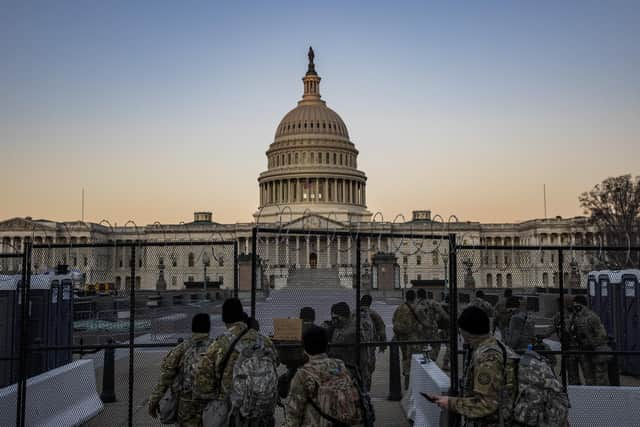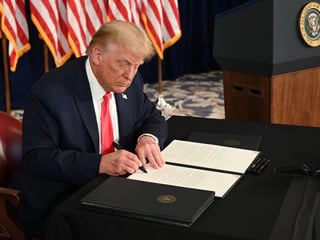Eight key questions ahead of Donald Trump's second impeachment trial
There is little realistic prospect of a conviction against the 74-year-old, but the repercussions of the proceedings will still be far reaching.
Here are some of the key questions as the trial begins.
Q: What is Mr Trump charged with?


A: The Democratic-led House of Representatives approved a sole charge, "incitement of insurrection", acting swiftly one week after the riot, the most violent attack on Congress in more than 200 years. The four-page article of impeachment says Mr Trump "gravely endangered the security of the United States and its institutions of government”.
Q: What are the chances of Mr Trump being convicted?
Advertisement
Hide AdAdvertisement
Hide AdA: With a two-thirds vote required, a conviction is all but impossible from the get go. Democrats need to persuade at least 17 Republicans to convict Mr Trump, a flip that looks unfeasible given the mood music surrounding a Republican party unwilling to distance itself from him. Last month, some 45 of the 50-strong contingent of GOP senators backed a bid to dismiss the trial, essentially telegraphing how the final vote will play out.
Q: How long will the trial last?
A: Details of the proceedings are still being negotiated by the Senate leaders, with the duration of opening arguments, senators' questions and deliberations all up for debate. It could be a week, or perhaps a fortnight.
Whatever the duration, it is unlikely to resemble the complicated three week-long trial that concluded last year with Mr Trump's acquittal a year ago on charges that he privately pressured Ukraine to dig up dirt on Joe Biden, then a Democratic challenger.
Q: What is the case for Mr Trump’s conviction?
A: In short, the prosecution case centres around the scenes witnessed the world over on January 6 when Mr Trump’s rally cry for his supporters to "fight like hell" was followed by some of the most shameful scenes in modern American history as a violent mob laid siege to the US Capitol building. The chaos that ensued left five people dead and hundreds injured.
So far, it appears there will be few witnesses called, as the prosecutors and defence lawyers speak directly to senators who have been sworn to deliver "impartial justice" as jurors. Most are also witnesses to the siege, having fled for safety that day as the rioters broke into the Capitol and temporarily halted the electoral count certifying Mr Biden's victory.
House managers prosecuting the case are expected to rely on the trove of visceral and disturbing video footage from the siege, along with Mr Trump's incendiary rhetoric refusing to concede the election, to make their case.
Q: What will Mr Trump say?
A: There will be an uncharacteristic silence from the disgraced 74-year-old, at least to begin with. His defence lawyers have declined a request for him to testify, and cut off from the social media channels through which he has rallied his supporters, he remains holed up at his Mar-a-Lago golf resort in Florida.
However, his new defence team has said it plans to counter with its own cache of videos of Democratic politicians making fiery speeches.
Advertisement
Hide AdAdvertisement
Hide AdDemocrats could subpoena Mr Trump, but to do so would invite a drawn-out legal battle, and in any case, those prosecuting the case believe such a step would not result in any significant new evidence to support their case, given Mr Trump’s well-documented incendiary remarks.
Q: Why prosecute him now he has left office?
A: That question has been the subject of spirited debate. Many Republicans say the US constitution cannot be twisted so as to force a former president to stand trial for impeachment, an argument that also allows them to focus on technicalities, rather than Mr Trump’s actions.
However, the Democrats have filed a pre-trial brief that states the constitution has no “January exception”, with the House impeachment managers noting: “Presidents do not get a free pass to commit high crimes and misdemeanors near the end of their term”.
There is legal precedent, given in 1876, William Belknap, the war secretary under Ulysses Grant’s administration, was impeached by the House the day after he resigned, with the Senate convening a trial months later.
More importantly, today’s Democrats believe there is a more fundamental principle at play with the trial – demonstrating to the US and the wider world the nation will defend its democracy and hold to account those who deign to threaten it.
Q: What would happen if he is convicted?
A: The Senate could pass a majority vote to bar Mr Trump from seeking office again, a notable punishment for someone who has dangled the potential of a 2024 presidential run to bend the party to his will and maintain his profile. A conviction would also have repercussions for the various perks and protections enjoyed by Mr Trump as a former president. But again, such prospects are so unlikely as to remain hypothetical.
Q: What happens if he is acquitted?
A: That question is one for the Republican party to ask above all others. Its focus ahead of Mr Trump’s second impeachment trial has been on procedural arrangements and constitutional technicalities, but it cannot indefinitely delay the reckoning over the future of the party and the place Mr Trump has in it.
Those Republicans who voted to impeach him have faced a backlash, ranging from vile death threats to censure by the GOP, and Mr Trump still commands a sizeable grassroots support. Efforts to pry the party away from his grip have been futile so far and the party faces difficult questions going forward.
A message from the editor:
Thank you for reading this article. We're more reliant on your support than ever as the shift in consumer habits brought about by coronavirus impacts our advertisers. If you haven't already, please consider supporting our trusted, fact-checked journalism by taking out a digital subscription.
Comments
Want to join the conversation? Please or to comment on this article.
